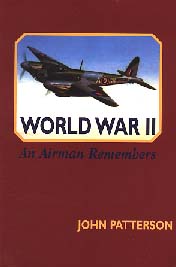|
________________
CM . . . .
Volume VII Number 19 . . . . May 25, 2001
excerpt: "We should be there soon. Only ten miles to go. I am excited. This is my responsibility. Are we too far south? I can see the harbour to the starboard and the tip of the peninsula to the port. We are to lay the mines right in the center across the harbour entrance. "Bomb doors open," I tell our pilot. Oh! I nearly forgot. Gee! It would be terrible if I dropped them safe. "Mines fused, number one selected. Bomb gone." Goldy watches the seconds tick by on his watch. "Ready, ready, go!" I select number two and push the button. "Number two gone." In a few more seconds the third and last is gone. Our pilot jams the control forward and down we go or rather up we go. Experiencing zero or almost zero gravity, I seem to be hanging in mid-air. Holy smoke, look at that flak ship below us all lit up by the tracer she is sending at us. It is curving away to our tail. Our speed outfoxed them. We got away easily enough that time. I wonder if the defences on the peninsula will open up on us. Our pilot is not taking any chances; he is circling out of range." (p. 64)John Patterson's account of his wartime experience in the RAF joins a growing body of similar memoirs. No two such stories will be quite the same, however; and Patterson's book will prove of genuine pleasure to anyone who has lived either through the experience, himself or has an interest in this unique phase of our history. Patterson does not attempt to outline either the broad background of the war, itself, or the intricacies of the air war. What we have is, therefore, not an attempt at history, but rather the recounting of the very specific circumstances and events that shaped one man's experience through that six-year conflict. If we do not end the book with a textbook understanding of the war itself, we do end with a rich understanding of what it, in fact, meant at the level of the individual participant. Moreover, it is a tale that we can very easily follow and enjoy without any special understanding of the larger backdrop against which it was played. John Patterson came to the war as a volunteer: a boy from a Saskatchewan farm who had just started work as an electrician's helper. He ended it as a Flight Lieutenant on his way to study at the University of Toronto and to a career as a mining geologist. Patterson is a gifted story teller and fluent writer, skills he demonstrated even as the teenager entering flight crew training. The diary he kept and the letters he sent used with good effect throughout the book are themselves full of colourful detail and the evidence of a mind trying to put an organization and meaning to a world of seeming chaos and for him constant change and movement. It was a life too frequently touched by tragedy and loss as he recounts the death of friends and strangers; but it is also a life of interest and of moments of genuine pleasure as he recounts leaves taken in exploration of England, of parties, dances and evenings at the "local," and of the hospitality of distance relatives and gracious strangers. In addition to roles as a flight instructor, the author went through two tours of duty with Bomber Command (each comprising some thirty combat missions) over Germany, France and Italy. Despite the ominous odds against survival, the author managed to get through with only a couple of crash landings on home ground and a Distinguished Flying Cross awarded by the King. The flying experience responsibilities as bomb-aimer and navigator (never, to his regret, as pilot) are given due attention, but a particular virtue of the book is its wealth of detail through description and an effective selection of photographs - of the larger events of war-time life in Britain: of life in the various training depots and flying fields ranging from the perennial discomforts of the lodgings, to the perennial search for culinary solace (the quality of food available and the odd intervals when it climbed beyond the mediocre becoming a continuing motif); and of life in training and instructing, with their own associated carnage which needed no help from the enemy. Patterson would not choose to think of war as "fun"; it involved just too much inherent tragedy. But if a necessary evil, it was also an exciting one; and it inevitably changed the world and the future for the individual participants as much as for the countries involved. That human dimension is Patterson's special forte; and his story provides a balanced illustration of that change, and of what it meant to be part of a fighting unit - but even more importantly, what it meant to be as part of a community at war. Recommended. Alexander D. Gregor is Associate Dean (Graduate Studies and Research), Faculty of Education, University of Manitoba.
To comment on this title or this review, send mail to cm@umanitoba.ca.
Copyright © the Manitoba Library Association.
Reproduction for personal use is permitted only if this copyright notice
is maintained. Any other reproduction is prohibited without
permission.
Published by
TABLE OF CONTENTS FOR THIS ISSUE - May 25, 2001.
AUTHORS |
TITLES |
MEDIA REVIEWS |
PROFILES |
BACK ISSUES |
SEARCH |
ORDER |
CMARCHIVE |
HOME
|
